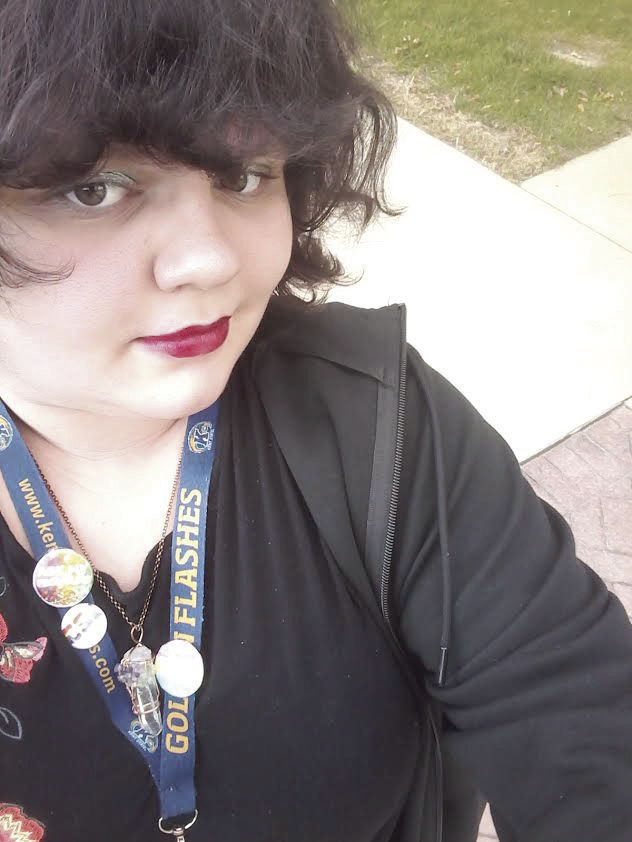Kent State witch gives insight on local Wiccan culture
October 28, 2018
Amanda Ambrose, a sophomore English major at Kent State, has been surrounded by the mysticism of witchcraft and pageantry since she was a child.
Wiccans believe in a spiritual system that encourages free thought and a deepened understanding of the balances of the earth and nature. Those who practice believe in a natural balance in the universe, and they are responsible for their own actions.
Ambrose’s mother practiced witchcraft most of her life, and she passed the practice down to Amanda and her younger sister.
“We used to do small stuff with my mother as kids because big spells take a certain amount of discipline not to go too far, and we were too young for that,” Ambrose said. “So we would put candles out and make sure the rocks were cleansed.”
Ambrose, 19, describes the death of her grandmother as what really piqued her interest in witchcraft.
“The death of my maternal grandmother really pushed me to get into it,” she said. “She died when I was 10, and I was really close to her. What was interesting about her is that she was a Christian and also a practicing witch.”
It wasn’t until her junior year of high school Ambrose started to sincerely practice on her own and develop her own methods.
Ambrose said she feels confident in her beliefs and her practice, though she isn’t a stranger to receiving mixed reactions when she shares with people what she does.
“My roommate is religious, and she is very understanding of my practice,” she said. “However, I had a friend in high school that was absolutely terrified of me.”
Ambrose can’t recall a time when she dealt with an extremely intolerant person who didn’t understand her practice.
“The worst that’s happened is I got called a ‘Satan worshipper,’ which isn’t accurate at all,” she said, laughing at the memory.
Ambrose said practicing witchcraft is very flexible, and it doesn’t require a rigorous schedule. She practices when she has the time or feels she needs to. Witchcraft comes in many forms, and Ambrose said participants can interpret the world of witchcraft however they see fit.
“Some people collect rocks and believe they have magical properties, like healing vibrations,” she said. “We also do spells. Most of the spell books I have were passed down from (my) mother.”
Ambrose said contrary to popular belief, spells aren’t anything like “Harry Potter” and other movies. There really is no “dark magic.”
“Spells are used to protect yourself and family members,” she said.
Ambrose’s specific practice has to do with rocks and crystals. She has a collection of rocks and jewelry pieces she keeps on display in her dorm room, right on her windowsill.
“I do believe that my rocks help, particularly quartz,” she said. “They give me a sense of grounding. If I know I’m getting stressed out, I can go to my dorm and sit by my rocks and write for a few minutes, and I’ll feel better.”
Ambrose is from Toledo — what she describes as a big city where she felt she had to “tone down” her practice. In Kent, she has met several other practicing Wiccans who she has been able to connect with and share beliefs.
“There’s not a club specifically, but there’s definitely a (Wiccan) community,” Ambrose said.
Ambrose said she shops at Empire, a gift shop in downtown Kent, for most of her witchcraft things. This helps her stay in touch with Wicca, the religion she identifies with.
“I don’t know if they’re Wiccans or Pagans (at Empire), but they do seem to know what they’re talking about quite a bit, which is really nice because I can go in there and be myself for a little while,” she said.
Ambrose speaks highly of the Wiccan community in Kent. The flexibility of witchcraft makes it a “melting pot of different systems and beliefs” because everyone who practices does it in a different way.
“We don’t get together and practice a lot; it’s mainly just sharing our different beliefs,” Ambrose said.“I have a Wiccan friend who believes in Norse mythology. I personally believe in Greek, so we can share those different ideas rather than get together and practice because there’s so many different ways to go with practicing.”
Ambrose perked up with excitement when she recalled the friends she made who have gained an interest in the practice because of her. One of Ambrose’s friends expressed her interest in the practice because it’s such a “different religion” compared to others on campus.
“I’ve gotten people interested in the practice to learn more about it,” Ambrose said. “I tell people I’m really close to, but it’s not something I’m super public about. I personally think that with this (article) for example, if someone wants to reach out to me, they can, because there’s someone else out here who practices.”
For Ambrose, witchcraft has loose guidelines, which is part of the appeal. She said it’s really about personal development for the individual who is practicing.
“It makes me feel better as a person to do it,” she said. “I guess the selling point would be that it’s a very diverse practice, and it’s loose for that reason, so you can figure out for yourself what works for you.”
Ambrose sees witchcraft continuing to be a part of her life for a long time and possibly becoming something she passes down to future generations, much like her mother did with her.
“Practicing has definitely given me more confidence,” she said. “On campus now, I feel like I have more of a free will to share it, especially because this campus is very diverse, and it seems to be more acceptable here. The craft itself gives me an outlet. It’s something that’s unique to me.”
Maria McGinnis is a features writer. Contact her at [email protected].












